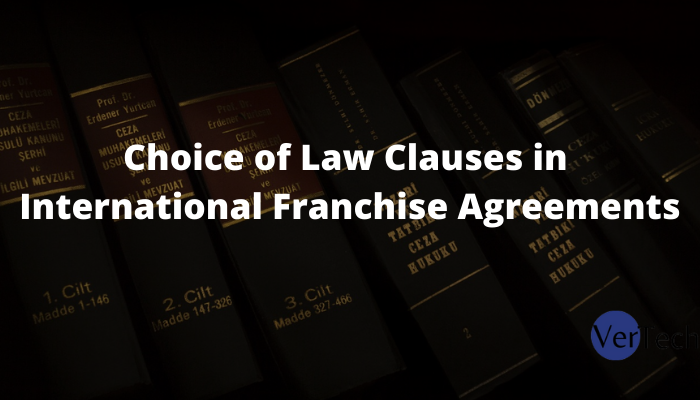Legal
Choice of Law Clauses in International Franchise Agreements

Most franchise agreements contain choice-of-law clauses specifying the law applicable to franchise contracts; research suggests that over 90% of international franchise contracts include choice-of-law clauses. The rights and obligations of the franchisor and the master franchisee are enhanced thanks to choice-of-law clauses.
Most U.S jurisdictions do not limit the choice of law adopted by franchisors but others limit the jurisdiction, that’s why you should consult a lawyer for an international master franchise agreement to know where you stand. Uncertainties will undoubtedly arise where the parties to a contract are based in countries because each country has its laws.
Advantages of a Choice of Law Clause
Including choice of law clauses in franchise contracts is standard practice today, and comes with the following benefits:
- Clarity
A choice of law clause in a franchise contract specifies the applicable laws when conflicts arise within the business. All the parties–the franchisor and master franchisee know which country’s laws govern the contract beforehand.
- Saves Time and Money
The time taken to resolve arising franchise disputes is reduced because the parties already know the applicable laws; they won’t need to hire a lawyer to determine the applicable laws, saving money.
- Certainty
Familiarity with the applicable laws ensures the disputing parties are certain of how disputes or other issues will be addressed. The choice of law has a great impact on the outcome of a case plus you cannot be caught off guard.
Limitations Choice of Law Clause
The limitations of choice of law clauses can include:
- Choice of law clauses cannot be included in insurance contracts in some states. The insurance companies insist on applying their consumer protection laws.
- Conflicts between the choice of law clauses and other terms of a contract, such as secured transactionsor the Uniform Commercial Code.
- Corporate governance issues are typically regulated by the country where the franchise is incorporated.
How Use of Language Impacts Choice of Law
The parties within a franchise and their lawyers often ignore how the choice of law clauses are drafted, particularly the language used. Using the wrong language can include a poor choice of words that would cause ambiguity, resulting in undesired expectations. You must ensure that the wording of the choice of law clause is clear–without ambiguity, and concise.
One word may have different meanings in different scenarios and it’s important to eliminate such loopholes that could cause conflicts. The wording can vary by industry, business, or contract but the universally accepted language used to draft a choice of law clause should be something close to the following:
“This agreement is governed and regulated according to the laws of (Country), excluding that Country’s choice-of-law principles. Dispute resolution, arising issues, default, and/or breach shall likewise be subject to the laws of (Country), excluding that Country’s choice-of-law principles.”
You must understand that courts can interpret a choice of law clause differently thanks to the drafting language applied. It would be unwise to use boilerplate language which may result in different interpretations in different courts or jurisdictions. Using standard language can help address other issues that are likely to occur in master franchise businesses.
Difference between Choice of Law and Jurisdiction
The terms “choice of law” and “jurisdiction” are often erroneously used interchangeably in contract drafting language, but they don’t mean the same thing in law. Choice of law clauses specifies which country’s laws are applicable in interpreting a franchise contract while jurisdiction specifies the court where the parties within the franchise can be file a lawsuit. A court in one country might be forced to apply the laws of another country when resolving a conflict or issue.
Choice of law clauses influences the creation of the parties’ rights rather than the enforcement of those rights. In other words, the choice of law clauses focuses on substantive law and not procedural law. For instance, if the choice of law clause for contract X specifies that the U.S federal law applies but a French court has jurisdiction, a case will be filed and litigated in the U.S, but French law will be applicable.
The language used to draft the choice of law clause can be modified in a way that both the jurisdiction and applicable laws of only one country are used. The laws of the preferred country under the choice of law clause don’t matter much but the country of jurisdiction matters very much because the litigating parties have to travel to that country for court proceedings.
How Can a Lawyer for an International Master Franchise Agreement Help?
Involving a franchise lawyer when drafting a franchise contract or agreement is important because they will ensure that the agreement is balanced–without favoring any party besides helping in drafting a clear, concise, and comprehensive document to avoid future conflicts.
Franchise agreements typically tend to favor franchisors so prospective investors need to involve a franchise lawyer when drafting the choice of law clause or franchise agreement.
-
Blog1 year ago
MyCSULB: Login to CSULB Student and Employee Portal – MyCSULB 2023
-
Android App3 years ago
Cqatest App What is It
-
Android1 year ago
What Is content://com.android.browser.home/ All About in 2023? Set Up content com android browser home
-
Software2 years ago
A Guide For Better Cybersecurity & Data Protection For Your Devices
-
Latest News2 years ago
Soap2day Similar Sites And Alternatives To Watch Free Movies
-
Android2 years ago
What is OMACP And How To Remove It? Easy Guide OMACP 2022
-
Android3 years ago
What is org.codeaurora.snapcam?
-
Business2 years ago
Know Your Business (KYB) Process – Critical Component For Partnerships
































